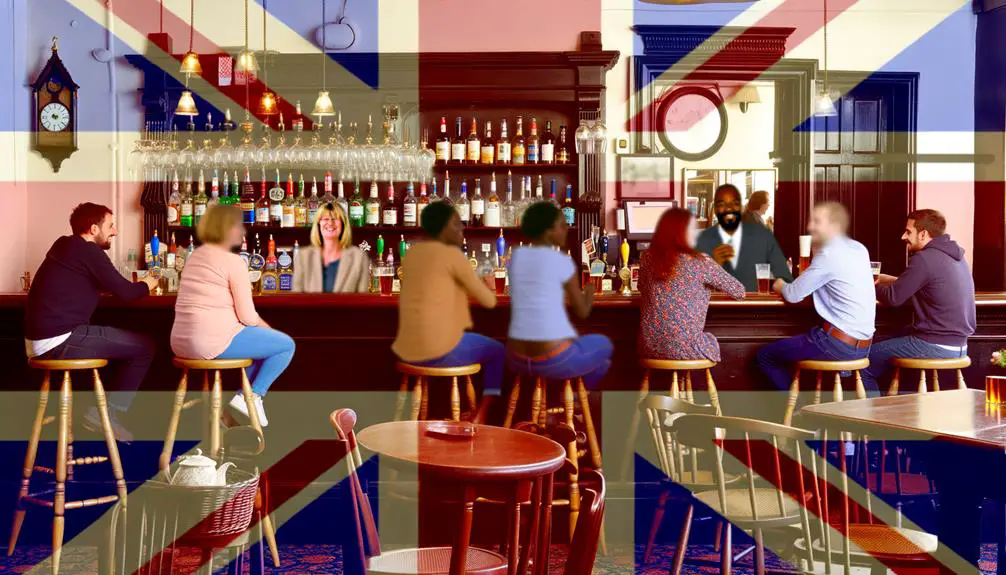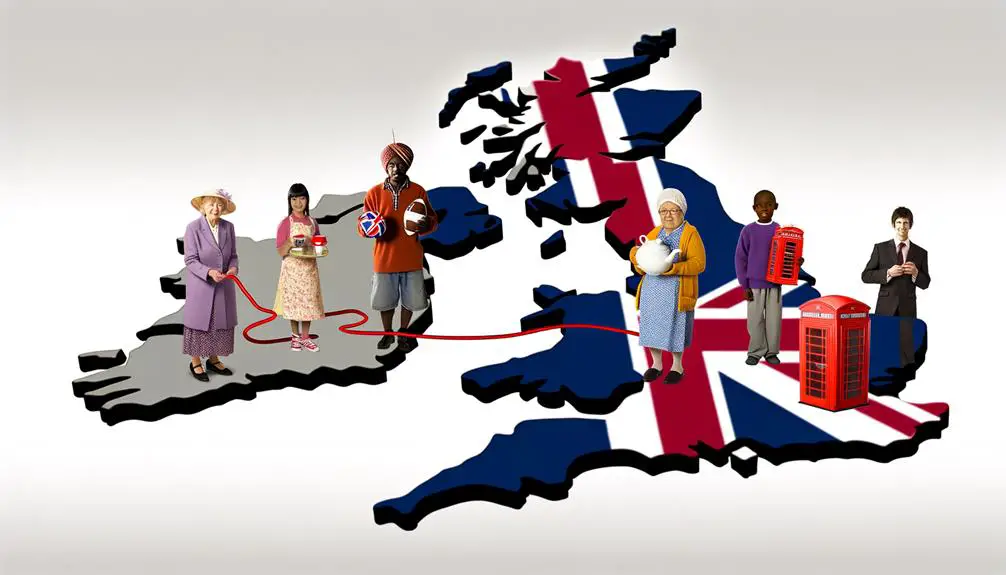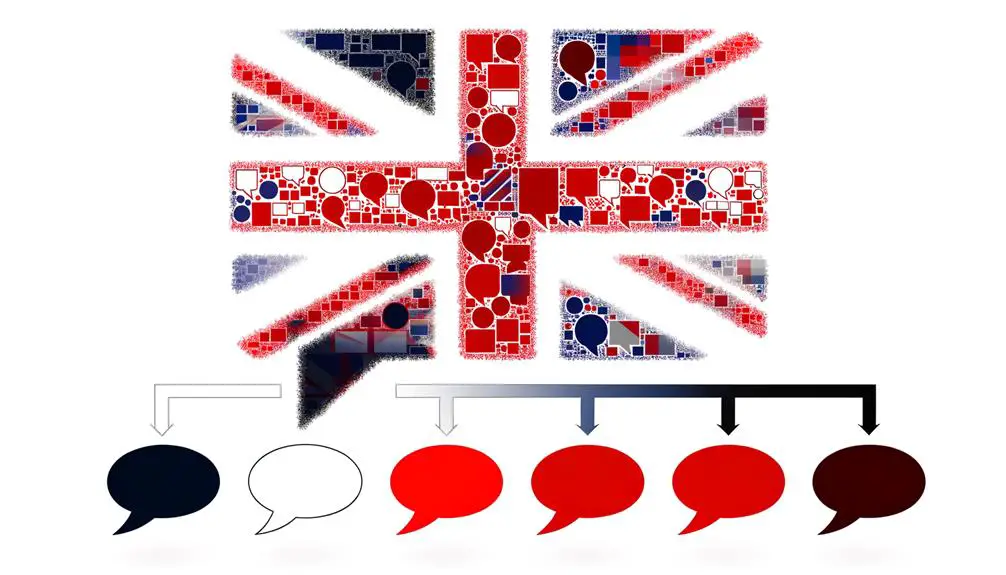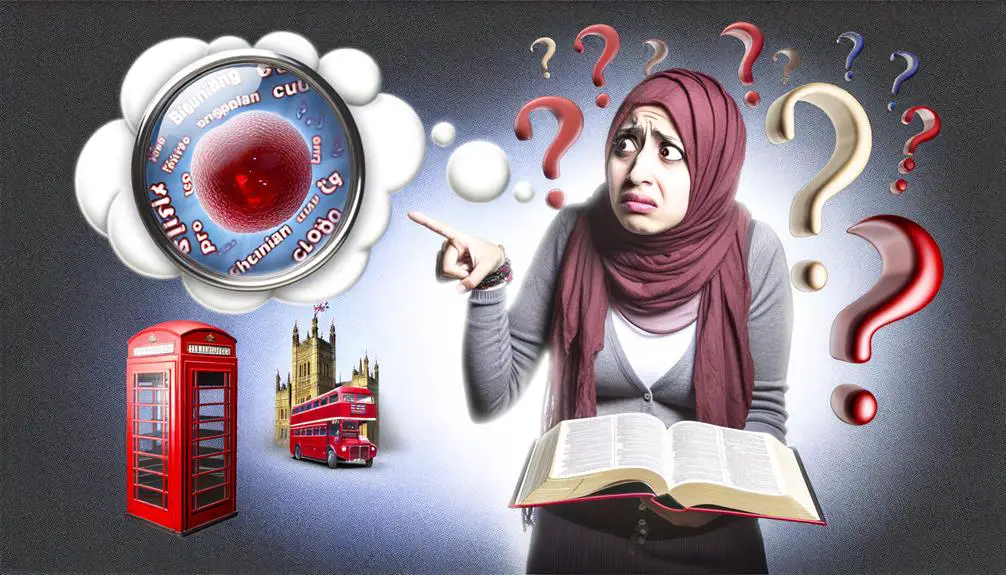In British slang, 'blood clot' stems from Jamaican Patois, showcasing the vibrant influence of cultural exchange on language. It's evolved from its literal meaning to express frustration or astonishment, adapting to the dynamic linguistic landscape of the UK. You're witnessing a term that transcends its medical origins, embedding itself as a colloquial expression rich in cultural significance. Its usage, tinged with emotion or expletive nuance, highlights the term's versatility and the context-driven nature of slang interpretation. This linguistic artifact, reflecting societal attitudes and linguistic creativity, opens a window into the evolution of language and culture. Exploring further reveals the depth of its impact across British society.
Key Takeaways
- In British slang, "blood clot" originates from Jamaican Patois, indicating a strong expletive or expression of frustration.
- The term transcends its literal medical meaning, evolving into a versatile slang expression used in various contexts.
- Its interpretation depends on context, serving either as playful banter or a sharp rebuke within conversations.
- "Blood clot" reflects broader cultural dynamics, showcasing linguistic creativity and adaptation within British society.
- The phrase's usage and significance vary across the UK, influenced by regional dialects and local cultural nuances.
Origins of 'Blood Clot'
Delving into the origins of 'Blood Clot,' it's clear that this phrase is deeply rooted in Jamaican Patois, reflecting a rich tapestry of cultural and linguistic influences. At first glance, you might think it's merely a medical term, but its journey from a literal description of coagulated blood to a staple of vernacular speech is a demonstration of the dynamic nature of language. Medical explanations fall short of capturing its full essence, as they focus on the physiological process rather than its metaphorical and cultural significance.
In international comparisons, the transformation of 'Blood Clot' from a medical condition into a colloquial expression highlights the unique path Jamaican Patois has carved on the global linguistic landscape. Unlike in other cultures, where medical terminology remains largely clinical, the incorporation of such terms into everyday language in Jamaica—and by extension, in communities influenced by Jamaican diaspora—underscores a broader phenomenon. It's an interplay between language, identity, and culture that transcends borders, illustrating how words can evolve far beyond their original meanings when transplanted into new social and cultural contexts.
Meaning and Usage
In exploring the meaning and usage of 'Blood Clot', it is important to acknowledge how this term transcends its literal origins to convey complex emotions and social contexts. The phrase, steeped in etymology debates, has morphed from its medical connotation to a slang expression fraught with intensity and sometimes disdain. Understanding its application requires diving into the nuances of its evolution, where it has been colored by cultural influences and linguistic shifts.
You'll find that 'Blood Clot' is used variably, often as an expletive or to express frustration, but its interpretation hinges on context. The pronunciation guide becomes essential here, as emphasis can alter its meaning or intensity. British slang, known for its rich tapestry of expressions, includes 'Blood Clot' as a term that can confound outsiders due to its layered meanings.
Its usage today straddles the line between offensive language and a colloquial gem, depending on who you're talking to and where. This duality is a reflection of the fluid nature of language, where words are imbued with the power to both isolate and unite. The debates around its etymology have only enriched its usage, making 'Blood Clot' a fascinating study of linguistic evolution.
Cultural Significance

Exploring the cultural significance of 'Blood Clot' reveals how it's become a mirror reflecting societal attitudes and linguistic creativity within communities. It's not just a phrase; it's a linguistic artifact, steeped in historical context, which gives insight into the evolution of language and social perceptions within British society, particularly among the Caribbean diaspora. The term, rich in history, showcases the dynamics of cultural identity and adaptation, illustrating how communities navigate and negotiate their place within a broader societal fabric.
In delving into the social perceptions tied to 'Blood Clot,' you'll find it serves as a barometer for understanding the complexities of cultural integration and the expressions of resistance or acceptance it can signify. This slang, with its roots deeply embedded in the Caribbean influence on British vernacular, offers a lens through which the interplay between language, identity, and power can be examined. It underscores the importance of recognizing the multifaceted nature of words, where they come from, and how they're repurposed and embraced by different groups, reflecting broader social currents and tensions.
Thus, 'Blood Clot' transcends its immediate meaning, embodying broader narratives of community, resilience, and the ever-evolving landscape of language.
Variations in Interpretation
You'll find that 'blood clot' morphs in meaning across the UK, shaped by regional dialects and the nuances of local culture. In conversation, its usage can range from playful banter to a sharp rebuke, highlighting the importance of context in interpretation. Misunderstandings are common, prompting clarifications that reveal the layered complexity of British slang.
Regional Slang Differences
Delving into the regional variations of British slang reveals that 'blood clot' doesn't carry a uniform interpretation across the UK, highlighting the intricate tapestry of local dialects. The way dialect influences not only the meaning but also the emotional weight of the term is fascinating. In some areas, its usage may be more playful or less severe, while in others, it's considered highly offensive. Pronunciation variations further complicate its interpretation, with certain accents or regional pronunciations altering its impact greatly. This divergence underscores the richness of British linguistic landscapes, where a single phrase can traverse a spectrum of meanings, shaped profoundly by the locality of the speaker. Understanding these nuances requires a thorough exploration into the cultural and linguistic contexts that shape regional speech patterns.
Usage in Conversation
Building on the understanding of regional slang differences, it's important to examine how 'blood clot' varies in conversation across the UK, shedding light on its multifaceted interpretations. You'll find that its use isn't static; rather, it evolves with modern expressions and the influence of social media. In some areas, it might be tossed around lightly among friends, a term of mock indignation or surprise. Elsewhere, its usage could be sharper, loaded with genuine frustration or anger. The context is king, and the tone can shift the meaning dramatically. Social media platforms amplify these variations, spreading regional nuances far and wide. You're witnessing a living, breathing aspect of language, reshaped by digital conversations and the quicksilver nature of online communities.
Misunderstandings and Clarifications
Traversing the labyrinthine world of 'blood clot' reveals a tapestry of interpretations, often leading to misunderstandings that underscore the complexity of regional slang. Language barriers and the relentless pace of slang evolution mean that even within the UK, the term can be a source of confusion.
- A humorous insult in one circle
- A term of endearment in another
- A bewildering phrase to non-native speakers
- A potential source of offense if misinterpreted
- A reflection of cultural and linguistic diversity
This linguistic variability demands a keen ear and an open mind. As 'blood clot' travels through different dialects and communities, its meanings morph, highlighting the dynamic nature of language and the importance of context in decoding slang.
In Music and Media
Exploring the domains of music and media reveals how the term 'blood clot' has woven itself into the fabric of contemporary vernacular, reflecting broader cultural dynamics and attitudes. In the world of music, particularly within genres deeply rooted in expressive freedom like reggae and hip-hop, 'blood clot' serves not just as a linguistic marker but as a symbol of resistance and identity. This usage underscores the ongoing dialogue between musical censorship and artist interpretations, where the term oscillates between a pejorative expletive and a powerful statement of dissent or cultural pride.
| Aspect | Significance |
|---|---|
| Musical Censorship | Reflects tensions between artistic expression and societal norms. |
| Artist Interpretations | Artists repurpose 'blood clot' to challenge or embrace cultural narratives. |
| Media Portrayals | Media amplifies the term, often stripping it of context, affecting perception. |
| Cultural Dynamics | 'Blood clot' mirrors shifts in language reflecting societal attitudes and values. |
Through this lens, you can see how 'blood clot' transcends its literal meaning, becoming a vessel for deeper expressions of identity, resistance, and community within music and media. This evolution is a tribute to the power of language to adapt and resonate across different spheres of influence.
Regional Differences

As you explore the intricate tapestry of British slang, you'll find that 'blood clot' transforms subtly yet meaningfully across the UK's diverse regions. Each area offers a unique spin, embedding the phrase within its own cultural and linguistic nuances. By examining local usage examples, you uncover a rich spectrum of meanings and contexts, highlighting the dynamic nature of language across geographical divides.
Variations Across UK
Delving into the regional variations of British slang, you'll find 'blood clot' carries nuanced meanings across the UK, reflecting the diverse linguistic landscape. This diversity is deeply rooted in dialectical influences and pronunciation nuances that shape how expressions are used and understood.
- In Liverpool, the term might be infused with a distinct Scouse accent, adding a unique twist.
- Scottish interpretations can lean towards more playful or aggressive tones, depending on context.
- In London, particularly within multicultural communities, it's often heard with a blend of British and Caribbean inflections.
- Welsh speakers might rarely use it, preserving a linguistic distance from English slang.
- In Northern Ireland, the phrase could be almost entirely absent, highlighting the complexity of regional slang adoption.
These variations paint a vivid picture of the UK's rich tapestry of dialects and cultural influences.
Local Usage Examples
Exploring the rich tapestry of regional dialects, you'll discover that 'blood clot' embodies a spectrum of meanings and usages across the UK, each deeply embedded in the local culture and history. This linguistic phenomenon highlights the complexity of slang evolution and underscores the nuances of conversation etiquette in different areas.
| Region | Emotional Connotation |
|---|---|
| London | Frustration, annoyance |
| Liverpool | Strong insult, disdain |
| Glasgow | Rare, but harsh rebuke |
| Bristol | Playful, less severe |
Analyzing this table, you'll feel the weight of words shaped by centuries, reflecting how regional identities shape language. 'Blood clot' transcends its literal meaning, becoming a mirror to societal attitudes and an artifact of linguistic heritage, challenging and enriching your understanding of British conversation etiquette.
Comparisons to Other Slangs
When comparing 'blood clot' to other slangs, you'll find its impact and nuances distinctly rooted in cultural context, offering a unique lens through which to understand its expressive depth. Through the process of dialectical evolution and linguistic adaptation, 'blood clot' has carved its niche within the tapestry of British slang, differentiating itself in both usage and connotation.
- *The vivid imagery it evokes,* unlike the more mundane or playful connotations of slangs like 'bloke' for a man or 'nosh' for food.
- *Its roots in Jamaican Patois,* showcasing the rich cultural interplay and diversity within British English, unlike slangs that are purely indigenous to the British Isles.
- *The emotional intensity it carries,* which is far more pronounced than the casual, often humorous nature of terms like 'gobsmacked' or 'chuffed'.
- *Its specificity in expression,* offering a stark contrast to the broad applicability of terms like 'knackered' for general tiredness.
- *The contextual sensitivity required when using it,* unlike more universally understood slangs such as 'mate' for friend, highlighting its unique place within conversational dynamics.
This comparison not only showcases the richness of British slang but also underscores the importance of understanding the cultural and social underpinnings that shape language.
Impact on Language Evolution

Having examined the unique cultural and emotional layers of 'blood clot' within British slang, let's consider how it exemplifies the dynamic nature of language evolution. This term, while deeply rooted in specific communities, showcases how languages adapt and change over time, reflecting societal shifts and technological advancements.
| Aspect | Impact on Language Evolution |
|---|---|
| Cultural Shifts | Reflects changing societal values and norms. |
| Globalization | Facilitates the exchange and fusion of slang across cultures. |
| Digital Communication | Accelerates the spread and adaptation of slang. |
| Language Preservation | Challenges and opportunities for sustaining linguistic diversity. |
| Youth Influence | Drives innovation in language use and slang development. |
In the digital era, you're witnessing an unprecedented speed in how slang like 'blood clot' spreads and evolves across the globe. Digital communication isn't just about faster dissemination; it's about transformation. Terms are plucked from their original contexts, repurposed, and shared widely, often gaining new meanings in the process. This phenomenon underlines the importance of understanding and documenting the evolution of language for preservation. As you engage with terms like 'blood clot', you're not just using slang; you're participating in the living history of language, contributing to its richness and diversity.
Controversies and Debates
Amid the dynamic evolution of language, you'll find that 'blood clot' stirs significant controversy and debate, reflecting deeper societal tensions and diverging perspectives. This term, rooted in British slang, has transcended its original context to evoke a broad spectrum of reactions and debates, highlighting the complex interplay between language, identity, and societal norms.
The controversies and debates surrounding 'blood clot' can be encapsulated through several key points:
- Legal implications: Its usage has sometimes crossed the boundaries of free speech, leading to legal scrutiny and discussions about where the line should be drawn.
- Societal reactions: The term has sparked a wide range of responses, from outright rejection to appropriation in different cultural contexts.
- Cultural sensitivities: Debates often center on the term's potential to offend, reflecting broader conversations about cultural respect and understanding.
- Language evolution: The controversy underscores the fluid nature of language and its capacity to reflect changing societal values and tensions.
- Freedom of expression: The discussions around 'blood clot' also touch on the right to freedom of expression, questioning the balance between this right and the responsibility not to cause harm.
Your understanding of these debates offers a window into the ways language can both mirror and shape societal dynamics, inviting a deeper reflection on the power of words.







